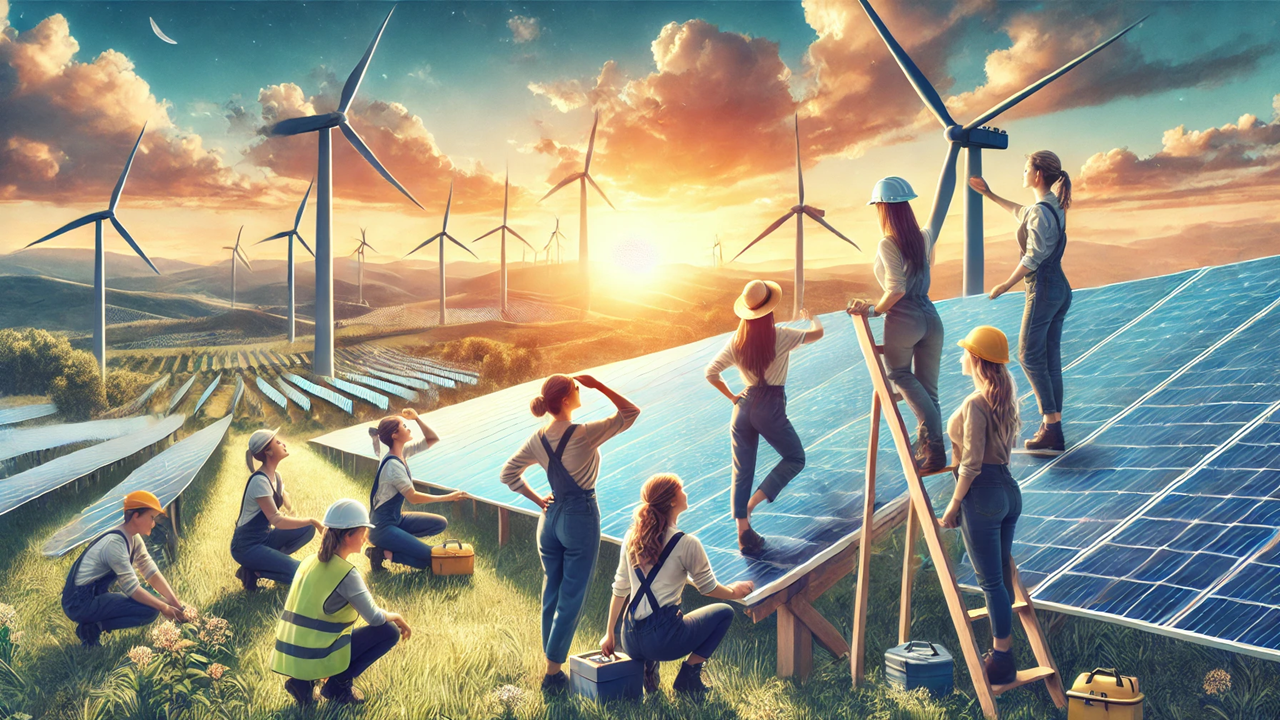Empowering Women in Renewable Energy: The Key to a Greener, More Equitable Future
This article highlights the findings of the World Bank report on women's employment in the renewable energy sector in the East Asia and Pacific region. It discusses the economic and social imperatives for increasing women's participation in the sector and outlines strategies for expanding opportunities for women, including leadership commitment, STEM education, addressing cultural norms, and supporting female entrepreneurship.

Bridging the Gender Gap in Renewable Energy
As the world pivots toward a more sustainable future, the renewable energy (RE) sector is poised to create millions of jobs. However, a critical challenge remains: ensuring that women have equal opportunities to participate in this burgeoning field. A recent report titled "Women's Employment in Renewable Energy in the East Asia and Pacific Region" by the World Bank sheds light on the current state of gender equality in the sector and offers actionable strategies to bridge the gap.
The report highlights that while the RE sector is set to play a pivotal role in global job creation, women remain significantly underrepresented, particularly in technical and leadership roles. This disparity not only limits the potential of the sector but also undermines efforts to achieve broader social and economic goals.
The Economic and Social Imperative
Increasing women's participation in the renewable energy sector is not just about fairness—it's about smart economics. Studies consistently show that companies with diverse workforces, including a higher representation of women, tend to perform better financially and are more innovative. The report underscores that equitable representation of women in the RE sector is essential for achieving Sustainable Development Goals (SDGs), particularly SDG 5 (Gender Equality) and SDG 7 (Affordable and Clean Energy).
However, the path to achieving this is fraught with challenges. National labor statistics often fail to provide gender-disaggregated data specific to the RE sector, making it difficult to assess and address the gender gap. While organizations like the International Renewable Energy Agency (IRENA) have made strides in collecting such data through surveys, there is still a long way to go.
Expanding Opportunities for Women
To address these challenges, the report outlines several strategies to enhance women's participation in the renewable energy sector,
Leadership Commitment: The success of any initiative to promote gender equality hinges on leadership buy-in. The report recommends that renewable energy organizations and projects cultivate a strong commitment from senior management to champion gender equality. This includes setting clear targets for female representation and providing the necessary resources to achieve these goals.
STEM Education and Training: Building a pipeline of future female professionals is crucial. The report advocates for increased access to STEM (Science, Technology, Engineering, and Mathematics) education and training for women. Partnerships between RE organizations and educational institutions can offer scholarships, internships, and vocational apprenticeships targeted at women, helping to prepare them for technical roles in the sector.
Addressing Cultural Norms and Discrimination: Cultural barriers, discrimination, and sexual harassment remain significant obstacles to women's participation in the RE sector. The report suggests adopting gender-sensitive recruitment practices, providing training on gender bias, and establishing clear policies against harassment. Creating an inclusive workplace culture where women feel valued and respected is essential for retaining female talent.
Supporting Female Entrepreneurship: Promoting women-owned businesses in the RE sector is another key strategy. The report encourages renewable energy companies to adopt gender-responsive procurement policies, such as preferential scoring for women-owned businesses in tendering processes. Additionally, providing financial support, such as dedicated funds or credit lines for female entrepreneurs, can help women establish and grow their businesses in the sector.
The Road Ahead
The journey toward gender equality in the renewable energy sector is complex and requires a multifaceted approach. The World Bank report concludes that better data collection, leadership commitment, and targeted interventions are critical to increasing women's representation in the sector. By addressing these challenges, the renewable energy sector can not only become more inclusive but also more innovative and resilient.
As the world accelerates its transition to clean energy, ensuring that women are not left behind is both a moral and economic imperative. The strategies outlined in this report provide a roadmap for policymakers, industry leaders, and educators to create a more equitable and sustainable future.
- FIRST PUBLISHED IN:
- Devdiscourse
ALSO READ
Germany's Plan to Balance Renewable Energy Costs
Maldives’ Green Leap: Transforming Outer Islands with Hybrid Renewable Energy
South Africa Looks to India for Renewable Energy Insights
L&T Launches New Renewable Energy Business Vertical
Sterlite Power Acquires Khavda IV C Power Transmission Ltd: Boosting India's Renewable Energy Infrastructure










